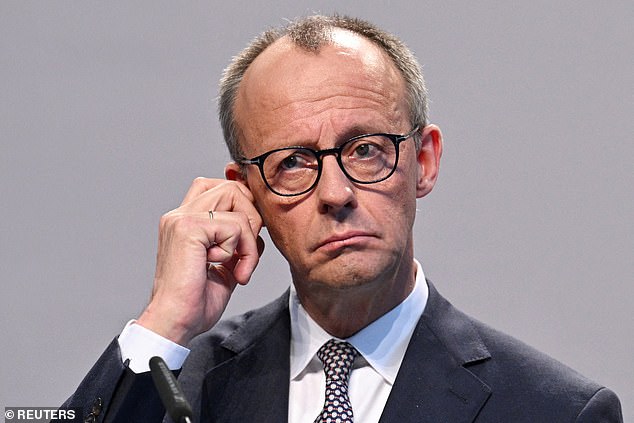Germany will not accept more than 100,000 asylum seekers a year due to schools and hospitals becoming ‘overwhelmed’, its incoming chancellor has vowed.
Friedrich Merz, the head of the Christian Democrats (CDU) who will be sworn in next month, said immigration figures ‘need to significantly’ come down below six figures amid pressure on public services and towns.
Despite a fall in asylum applications by almost a third last year, Germany is still the most popular European destination for migrants, with 235,925 initial applications made.
The CDU leader’s aim would mean claims would need to fall by another 56 per cent to fall below 100,000.
Merz is under intense political pressure to slash migrant arrivals further after the far-Right Alternative for Germany (AfD) party came second in February’s elections.
‘Our position is that these figures need to significantly come down,’ he told Caren Miosga, a German talk show.
‘It can no longer be a six-digit figure – towns, communities, schools, hospitals and infrastructure are overwhelmed.’
He added: ‘There has been a lot of change in Europe. Many attempts [at change] failed in Germany however in recent years. Going forward, this will no longer be the case.’

Merz is under intense political pressure to slash migrant arrivals further after the far-Right Alternative for Germany (AfD) party came second in February’s elections

He said immigration figures ‘need to significantly’ come down below six figures amid pressure on public services and towns
Last week Merz announced that the CDU had agreed a coalition deal with the centre-Left Social Democrats (SPD).
The partnership would involve a tougher migration policy, including plans to end the path to German citizenship after three years of residency.
Under the new rules, migrants will only be eligible for naturalization after five years of successful integration.
At a joint press conference in Berlin, he said: ‘We will embark on a new course in migration policy.
‘We will better organize and manage, with the aim of largely ending irregular migration.
‘There will be controls at national borders and also returns of asylum seekers at the border. We will intensify deportations, end voluntary admission programs, and suspend family reunification.’
Other policies planned include increasing the capacity for detaining migrants pending deportation, the suspension of family reunification for migrants for two years, and expanding the list of of safe countries that migrants can be sent back to to include Algeria, India, Morocco, and Tunisia.
Germany recorded a net migration rate of around 400,000 people in 2024, and is focused on attracting skilled workers, such as IT professionals from Asia.

Last week Merz announced that the CDU had agreed a coalition deal with the centre-Left Social Democrats (SPD)

The new coalition government will introduce a tougher migration policy, Merz vowed

The AfD won 152 seats and more than 10million votes on an anti-migrant policy ticket, but they are seen as controversial by many German voters

Merkel said she ‘could not remain silent’ while an anti-immigration motion was passed with the support for the AfD in February
Last week a CDU MP who negotiated the coalition deal said Germany may resort to triggering emergency clause Article 72, to turn back refugees from land borders.
Günter Krings, who represents North Rhine-Westphalia, said: ‘More than four million asylum seekers and war refugees came to Germany in the last decade, our capacities to integrate so many people into our society are exhausted, our public order and internal security severely affected.’
The CDU became the largest party in the Bundestag in February after winning 208 seats.
They received 14million votes – less than four million more than the AfD, who won 152 seats on an anti-migrant policy ticket.
Alice Weidel, the AfD leader, has described the coalition deal a ‘capitulation document’ and accused Mr Merz of reneging on campaign promises.
Meanwhile, former Chancellor Angela Merkel said she ‘could not remain silent’ while an anti-immigration motion was passed with the support for the AfD in February.
Merz had previously said that the CDU would never rely on far-right votes.
This article was originally published by a www.dailymail.co.uk . Read the Original article here. .


